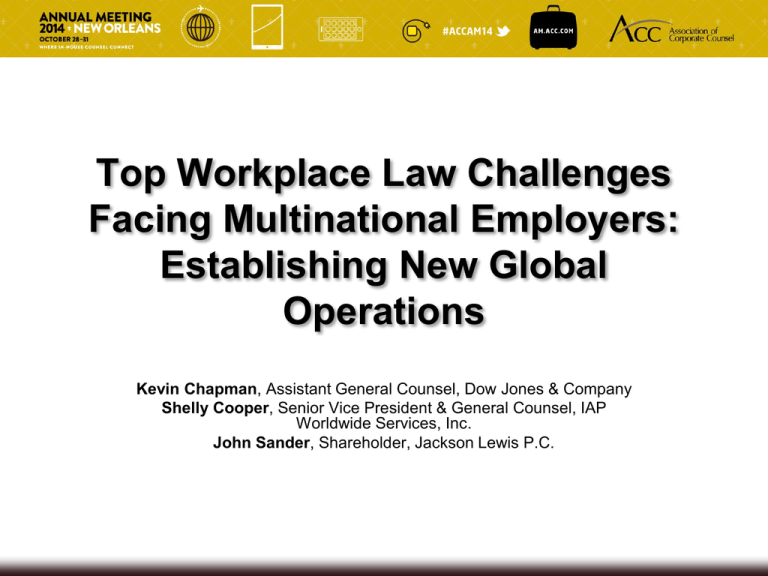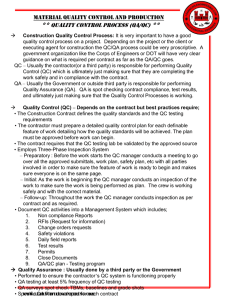
Top Workplace Law Challenges
Facing Multinational Employers:
Establishing New Global
Operations
Kevin Chapman, Assistant General Counsel, Dow Jones & Company
Shelly Cooper, Senior Vice President & General Counsel, IAP
Worldwide Services, Inc.
John Sander, Shareholder, Jackson Lewis P.C.
Overview
• Do you need employees at all: the
independent contractor/employee conundrum
• Establishing the new local operation
• Establishing the employment relationship
(both local and ex-pat)
• Implementation of policies and handbooks,
both global and local
2
Scenario
ABC Company has decided to expand into international markets for
the first time. The Company’s plans vary quite a bit among
individual markets; in some cases the objective is simply to have
one or more contacts in place to call on customers and assess the
potential for growth, while in others the Company wishes to have
an established presence. The head of the business unit, Polly
Pushhard, and her chief deputy, Eddie Earnest are charged with
launching the business and growing revenue immediately, and
accordingly are pressing the Law Department to develop a plan for
moving forward in all markets as soon as possible.
3
Scene 1
The first question in your mind is whether the Company
needs to have a corporate presence and employees in all
markets, or whether some can be staffed with independent
contractors (with no corporate presence) or through a
representative/liaison office with lesser formalities than a
corporate subsidiary. What factors will you look at, and what
are the pros and cons you will consider, in making
recommendations?
4
Do You Need Employees At All?
•
•
•
•
Most countries explicitly differentiate between independent contractors
and employees.
Independent contractors may have some protections in civil codes (e.g.
calculation of sales commissions on termination) but are not entitled to
benefits and are responsible for their own tax filing and payment. The
employee enjoys the vastly greater benefits of the local labor code and
social benefit schemes, and the employer has the obligation of social
tax contributions and income tax withholding.
As in the US, rarely a bright line determination, but the touchstone is
the extent of the individual’s subordination to the direction of the
company.
The stakes of mischaracterization are generally much higher outside
the US in light of more extensive social benefits, unfair dismissal
protection, and more aggressive penalties and enforcement.
5
Key Aspects Of An Independent
Contractor Relationship
•
•
•
•
•
•
•
•
•
Clear documentation of the parties’ intent to create an IC relationship, including
contractor’s responsibility for own benefits and taxes—but this is just the starting
point, as courts nearly everywhere will look to the realities of the relationship if
they conflict with the document
Avoidance of employment-like compensation such as bonuses and stock
incentives
Project-based services achieved without ongoing direction
Contractor provides own office and equipment, sets own hours
Limited duration, mutual right to terminate without cause
Contractor free to work for, and preferably does work for, other customers
Avoidance of use of company business card, titles, e-mail address
Contractor is preferably a business entity, with contractor free to use other
individuals to provide services
Where applicable, contractor registers with local trade and/or tax authorities
6
Recharacterization
• Disputed termination by company of
contractor relationship
• Tax audit of contractor
• Contractor holds itself as company
representative to third parties
• “Mission creep” as contractor takes on more
responsibilities over longer time period than
originally intended
7
Consequences of Recharacterization
• Back payment of social tax contributions and
associated penalties
• Back payment of overtime, mandatory holidays and
leaves, other employment benefits
• Termination of contractor agreement treated as
unfair dismissal subject to notice, severance,
damages
• Possible “permanent establishment” tax exposure
• In some countries, criminal fines and even
imprisonment of legal representative
8
Representative/Liaison Offices
• Many countries provide for a form of
representative office which is simpler to
create and maintain than a local subsidiary
• Functions generally limited to exploration of
opportunities, market research, etc.
• May be possible to retain a representative
outside the local labor/employment law
9
Scene 2
In several markets, the Company has determined that a subsidiary
and employee presence will be necessary to carry out its business
objectives. Eddie Earnest has reached out to Human Resources
for assistance in hiring staff for the new office. He figures that he
needs a staff of 5-10 salespeople, along with 2-3 office support
staff who will handle orders, marketing, and customer service. He
wants to use current company employees (US citizens) on ex-pat
assignments to serve as the office staff on a 2-year rotation. Your
HR manager, Holly Stepstraight, has come to you for some
guidance. You immediately call a meeting with Holly, Eddie
Earnest, and Polly Pushhard to discuss the issues. What are the
other relevant employment-related issues you need to consider?
10
Employment-Related Issues
• Pre-hire Contingencies – Legal/HR Considerations
– Drug screens
– Background checks
– Skill/ability testing
– Reference checks
– Other types of employment testing
11
Employment-Related Issues
• Residency/Work Authorization
– For Expat personnel
• Business/Tourist Visit Visa
– Duration and Scope Limitations and
Restrictions
– Risks, Cost and Benefit Considerations
• Residency and Work Authorization
– Requirements
– Timing
– Process
– Cost
12
Employment-Related Issues
• Total Compensation & Benefits Package
– Statutory Elements
– Competitive Elements
– Equity Considerations (US National, Foreign National, Local
National)
– Minimum Wage Considerations
– Engagement Rules and Options (i.e., commission-only
compensation)
13
Employment-Related Issues
• Establishing Administrative Support Functions
– Support Areas
– Factors to Consider
• Corporate Control
• Authority Matrix
• Economics
– Support Approach
• In-House
• Outsource
• Hybrid
14
Employment-Related Issues
• Unique Issues for U.S. Government Contractors?
– Licensing and Registration Requirements
– Presence of a Status of Forces Agreement, Tax Treaty or
Diplomatic Note
• Immunities and Exemptions
– Export and Trade Compliance
– Engagement of Local Nationals (i.e., Saudization,
Kuwaitization)
– Security Clearance Access Requirements
– Compliance with Local vs. U.S. Federal Laws
• What happens when laws are in conflict?
15
Other Considerations - Competition
• What restrictions are utilized in the local market by
competitors who may challenge the sourcing and
engagement of new personnel (from their ranks)?
• Is non-compete and non-solicit language used and
enforceable in the local market?
• Do you need to secure a no-objection certificate (NOC)
from the current employer to release its employee to join
ABC Company?
16
Other Considerations - Training
• To establish a local sales force, what are the competency
training requirements for ABC Company personnel to
represent and effectively market and sell ABC Company’s
products?
• Are there any export control issues?
• Are there any steps that must be taken to ensure ABC
Company’s product can be sold legally in the local market?
• Any personnel licensing requirements and/or protection of
intellectual property implications?
• Can you bring (US-developed) product training to them, have
new personnel come to US HQ for training, or do you need to
develop new training to specifically target this new local
market?
17
Other Considerations –
Doing Business In-Country
• At what point, if any, does ABC Company have to be
licensed and/or registered to do business in the foreign
country?
• Is a local tax ID required?
• Need to produce adequate books and records to satisfy
commercial registration requirements?
• Vet local/international accounting firm for annual audited
financial statements.
18
Other Considerations – Doing Business
In-Country (Cont’d)
• Need to retain local counsel to start subsidiary
formation
– Type of entity
– Capital requirements
– Bank account minimums (need an internationally
recognized bank)
– Will ABC Company be able to transfer funds outside
of the country (i.e., Libya – cannot transfer funds once
deposited in Libya )?
• Is a letter of guarantee (or credit) required?
• Conduct due diligence/vet local counsel
19
Other Considerations –
Foreign Sponsor
• Establish who will be the legal or foreign representative (i.e.,
sponsor), if necessary, of the subsidiary company for local
legal purposes, such as signing employment contracts, filing
required disclosures for the local government, signing off on
hire/fire paperwork and representing ABC Company before
various labor and social services ministries.
• What will be the role of the foreign sponsor regarding
traditional non-labor matters?
• Determine how to preserve the appropriate internal controls
while at the same bestowing a sufficient amount of autonomy
to be successful. What are the legal means to accomplish
(i.e., job description, separate employment agreement, or
authority matrix )?
20
Other Considerations - Taxes
• Is there a bi-lateral tax treaty or diplomatic note in place
which would yield any relief for US Expats as it relates to
personal income tax on earnings in country?
– If no, what is the strategy to mitigate costs to employee and risk
to the ABC Company with regard to US expat personnel in
country – tax protection?
– Tax equalization?
• Do the costs associated with tax protection/equalization
present a situation in which office functions should be
transitioned from US Expat personnel to Local National
(LN) personnel?
21
Other Considerations - Banking
• Is the employee required to open a local bank
account?
• Receive pay in local currency?
• Is there a minimum?
• Any limitations as it relates to payroll source (US or
local, or both)?
22
Scene 3
Polly Pushhard is now sending daily emails asking Holly
Stepstraight when ABC Co. can start hiring local employees and
sending some US employees to the newly established office. Holly
has asked you to provide appropriate employment contracts for the
local salespeople and for the ex-pat office staff. You are now
preparing for a call with your outside counsel to discuss what kinds
of contracts or other documentation are necessary. What issues
will you need to address?
23
Establishing the Employment Relationship
• The local employment contract
– Required in many countries
– Even where not required, contract terms may be
better than default terms in labor code
– Protection of confidentiality/inventions,
commitment to and acknowledgement of
compliance obligations, non-compete/nonsolicitation, post-employment cooperation with
litigation/investigations
24
Drafting Global Employment Contracts
• Globalized, “one size fits all” approach—
headquarters pushes down a global template
with local variation only as required by law,
collective labor agreement, or strong custom
• Every contract is local based on templates
created by local HR and local counsel
• Hybrid approach—headquarters identifies
certain desired provisions which are
incorporated into a local format
25
Advantages of Standardization
• Consistency across businesses and countries
• Ensuring that key corporate requirements (e.g. confidentiality,
appropriate use of restrictive covenants, post-employment
cooperation with litigation and ongoing investigations) are
included
• Maximizing flexibility in assignments and restructuring,
consistent with local law
• Highlighting commitment to compliance with law and Company
policy
• Facilitating management of workforce by HR/managers with
global organizations, and legal support by headquarters or
regional counsel
• Avoiding counterproductive “freelancing” by local
management/HR
26
Challenges of Standardization
• Complexity of adapting a template to local legal requirements
across jurisdictions
• Even within country, complexity of applying same template to
multiple business units with different collective bargaining
agreements and/or works council arrangements
• Local language requirements
• “One size fits all” approach can lead to lengthy contracts with
material irrelevant to individual employee
• Time, resources, aggravation involved in determining whether
local variations from template will be permitted
• Cultural resistance to perceived “command and control”
27
A Hybrid Approach
• Define a set of provisions to be applied as much as
possible to all employees (e.g. confidentiality/invention,
commitment to compliance, maximum permissible
flexibility in place of work/nature of
assignment/compensation)
• Define an additional set of provisions to be applied to
senior-level or key employees (e.g. non-compete/nonsolicitation, cooperation with litigation/investigations)
• Require that local contracts contain the designated
provisions subject only to required local adjustment
• Otherwise use the local format and template provisions
28
Key Expatriate Arrangements
• Expatriate assignment (including secondment)
• Global Employment Entity
• Dormant or Suspended Contract
• Transfer/localization
29
Threshold Issues in Entering Into a Global
Mobility Arrangement
•
Immigration/Work Authorization
• Time, Expense, Complexity
• Family residence permit/spouse work authorization
•
“Permanent Establishment” Tax Issues
•
Compensation/Benefit Issues
• Maintaining key home country compensation and benefits
• Allowances—housing, education, cost of living, hardship
• Local payroll arrangements and benefits
•
Documentation
• Assignment letter
• Secondment/services agreements
• Local contracts
30
Managing the Global Mobility Arrangement
•
Practical Considerations
• Turnover caused by management changes, employee failure to
adapt to the overseas position
• High sophistication of many globally mobile employees in obtaining
beneficial individual treatment
• Complexity in finding the right mix of global mobility support
functions (Law vs. HR, HQ vs. local management, inside vs.
outside counsel, legal vs. accounting/tax) can lead to inconsistency
and gaps
•
Control of corporate governance, local contracts
•
“Global nomad” phenomenon
31
Scene 4
Holly Stepstraight has advised you that the local office is up
and running. Holly wants to know if the new hires (and the
transferring expats) should receive a copy of the Company’s
Employee Handbook and Code of Business Conduct – and
Holly is wondering if everything in the Company’s policy
handbook is applicable to the employees in the foreign office.
You are now back on the phone with outside counsel and,
aside from wishing you had thought of this months ago, you
need to address what issues?
32
Corporate Handbooks/Policies
• General Issues and Implementation
Concerns
– Whether an employee handbook is
mandatory in the foreign jurisdiction (e.g.
Japan, France, Netherlands, Belgium).
– In such jurisdictions, decide whether to use
“standard” terms in order to conform to
local law and custom.
33
Corporate Handbooks/Policies
• Notice to and Consent by Employees: It is usually
required or advisable to inform, consult and/or
bargain with any unions (Work Councils) or formal
employee representatives who represent your
employees before rolling out any new policies.
–
–
In some countries (France, China) there is a very formal
notice, discussion, approval, and publication process that
must be followed before any new company policy will be
effective.
In other jurisdictions (Germany, Italy) negotiations with a
works council may be required before adopting any new
policies.
34
Corporate Handbooks/Policies
• Translations: In most cases it will be necessary to
translate the policies into local language, even if all
your employees are ex-pat US Citizens who speak
only English.
• Belgium, Chile, China, France, Portugal, Turkey,
Quebec, Canada, and others will not recognize or
enforce policies that are distributed in English.
• A side-by-side translation will work in most places
– but not all.
35
Corporate Handbooks/Policies
• Communications to Employees –
Acknowledgements of Receipt.
– For some countries, formal acknowledgement is
required for enforcement – mouse click not enough
– May need to formally amend employment contract
– How to handle employees who don’t sign
– Must maintain records of acknowledgements
– HR Distribution and check-off is an option
– Can tie consent to some discretionary payment
(bonus)
36
Corporate Handbooks/Policies
• Amendment or Repeal of current policies and/or
Work Rules. Formally amend or repeal any existing
rules or policies so that you do not have two versions
of the same policy in effect.
– In Countries where published work rules are required
(including Japan, France, Netherlands, Belgium, Greece,
Korea, Poland), check to ensure that new policy does not
overlap with any published work rule.
– Expunge old policy statements from web site.
37
Corporate Handbooks/Policies
• Policies Issued Locally. Policies should be
formally adopted by and published by the local
legal entity (subsidiary, Branch Office, etc.) in
each country, rather than being published by the
parent company.
– Many local courts will not enforce a policy that has not
been issued by the employing entity, and formally
adopted by the local company
– Local legal references may also be required.
(Richardson v. Oracle, 2013 FCA 102 – Australia)
38
Corporate Handbooks/Policies
• More Generous Benefits. Having more generous
benefits than are required by local law may be good.
But, keep in mind that establishing a more generous
than required benefit may limit your ability to reduce
benefits in the future.
39
Corporate Handbooks/Policies
• Different minimum levels of benefits within the
same country. In some countries (China, India)
there are different minimum benefit levels required
in different locations.
• Mumbai and Delhi, for example, have different
minimum annual leave requirements.
• Beijing requires a special benefit for “late” maternity –
when the mother gives birth to a first child after the age
of 24.
• Consider whether to have uniform benefits (the
greater of all required) or to permit local variations.
40
Corporate Handbooks/Policies
• Covered Employees. In some countries
distinctions among full-time, part-time, and
temporary employees are not recognized.
Carefully review and revise any policies for
application outside the US if you don’t want the
policy to apply to everyone.
• Having a policy document that includes terms outside
the local lexicon may create confusion and potentially
expand the application of your benefits beyond what
you intended.
41
Corporate Handbooks/Policies
• Government Filings. In some countries, copies of
your policies must be on file with the local labor
ministry or other agency. Get local counsel advice
about the requirements and ensure that all
amendments and new policies are properly filed to
ensure enforceabilty.
42
Corporate Handbooks/Policies
• Specific types of Handbook Policies that May be
Problematic:
– Whistleblower hotline. In the US, Sarbanes Oxley requires
the existence of a whistle-blower process in which the
whistleblower can anonymously report corporate
wrongdoing.
• In Spain, it is unlawful for a company to permit an
anonymous report – the system must provide
identification of the complaining person.
• In the EU, the information provided via such an internal
reporting process may contain private information that
may not be transmitted to the home office. Privacy laws
elsewhere may also apply to internal complaints and
claims of the violation of local law.
43
Corporate Handbooks/Policies
• Specific types of Handbook Policies that May be
Problematic:
– Anti-Harassment Policy. A general workplace conduct policy
calling on all employees to behave in a civil and professional
manner may be fine. But specific prohibitions on
discrimination or harassment in the workplace based on
certain characteristics (e.g., sex, sexual orientation, marital
status, military service, religion, etc.) may run afoul of local
laws. The broader the scope of the anti-harassment policy,
the more likely it will need to be modified for particular
countries. Meanwhile, a US-based policy may not cover
concepts such as “bullying”, “mobbing”, or “social
harassment” that may apply under local law.
44
Corporate Handbooks/Policies
• Specific types of Handbook Policies that May be
Problematic:
– Code of Conduct/Standards of Business Practice.
– Confidentiality, Copyright, Trademarks, and other
Intellectual Property Issues.
45
Corporate Handbooks/Policies
• Specific types of Handbook Policies that May
be Problematic:
– Non-solicitation and non-competition agreements
– Notice required before resignation/Notice provided before
discharge.
– Time Off – Sick Leave, Vacation, Personal Days
– Leaves of Absence, including maternity/paternity leave and
disability
– Pre-employment background checks
– Hours of work & Overtime
46
Resources
•
•
•
•
•
Top Workplace Law Challenges Facing Multinational Employers
Detailed Scenarios
L&E Global Annual Publication – Employee v. Independent Contractor
Legal/Human Resources/Tax Questions for Local Counsel - Outside
Contiguous United States (OCONUS)
http://www.williamsmullen.com/news/international-business-planningadvisor-planning-tools-senior-executives
Link includes:
– International Business Development Strategic Planning Issues
– International Business Development Planning Checklist
– International Business Development Model Matrix
– International Business Development Country Localization Checklist
An International Guide to Employment Law Across 26 Jurisdictions
47









